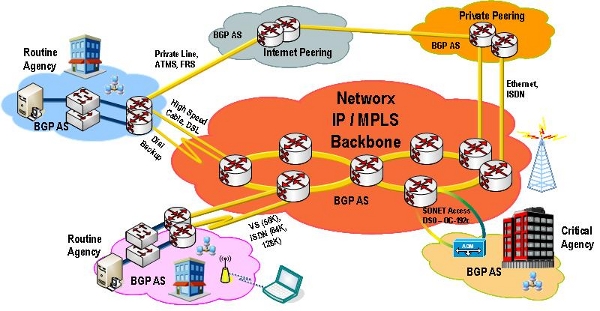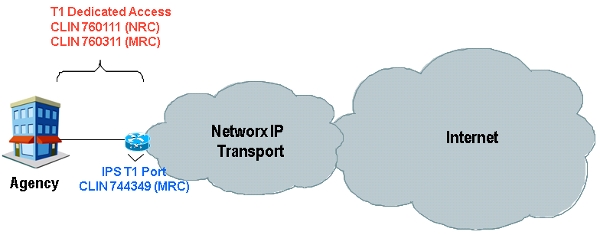IPS provides transport of Internet Protocol (IP) packets. IP is the primary protocol in the suite which is used for communicating data across a packet-switched internetwork. IP has the task of delivering packets to destination hosts based solely on their addresses. IPS supports a wide range of connectivity requirements that enable Government users to access the Internet as well as Government-wide intranets, and extranets.
IPS provides dedicated Internet access service on a Networx IP/MPLS (Multi-Protocol Label Switching) backbone. This IP/MPLS backbone delivers a broad range of IP transit and network interconnections tailored to meet the specific needs of Government Agencies. IPS employs the industry standard Border Gateway Protocol (BGP) with registered Autonomous System (AS) numbers as the routing protocol used to exchange routing information across the Internet.
The example shown below illustrates some of the key technical capabilities required for IPS. Agencies with both Routine and Critical Service Level Agreements (SLAs) are connected to the contractor's backbone network through contractor-provided access services that include dial-up ISDN ( Integrated Services Digital Network), DSL (Digital Subscriber Line), Ethernet, high speed cable, FRS (Frame Relay Service), PLS (Private Line Service), satellite, ATMS (Asynchronous Transfer Mode), and dial-backup. IPS will connect Agency SDP (Service Delivery Point) devices (e.g., customer routers, switches, and firewalls) as well as a wide range of equipment (e.g., notebook PCs, PDAs) to the Internet. The contractor will provide peering arrangements from the contractor's network to the internet.

Example of IPS Implementation
IPS is similar to the Internet Protocol Service offered on FTS2001 contracts. It supports the following technical capabilities:
The IPS feature set is described in Section C.2.4.1.2.1 of the Networx contracts (IPS Feature Set). It consists of:
Each Networx contractor may provide variations or alternatives to the offering and pricing for IPS. The specific details can be found within each Contractor's Networx contract files and pricing notes for IPS.
For more information on the general IPS specifications and requirements, please refer to Section C.2.4.1 of the Networx contract for technical specifications and Section B.2.4.1 for pricing.
IPS provides Agencies with Internet connectivity. CLINs are distinguished by access type:
IPS is similar to the Internet Protocol Service offered on FTS2001 contracts.
Price components required for full end-to-end service for Domestic and Non-Domestic IPS:
Example 1: IPS CONUS Dedicated T1

Each Networx contractor may provide variations or alternatives to the offering and pricing for IPS. The specific details can be found within each Contractors Networx contract files and pricing notes for IPS.
For more information on the general IPS specifications and requirements, please refer to Section C.2.4.1 of the Networx contract for technical specifications and Section B.2.4.1 for pricing.